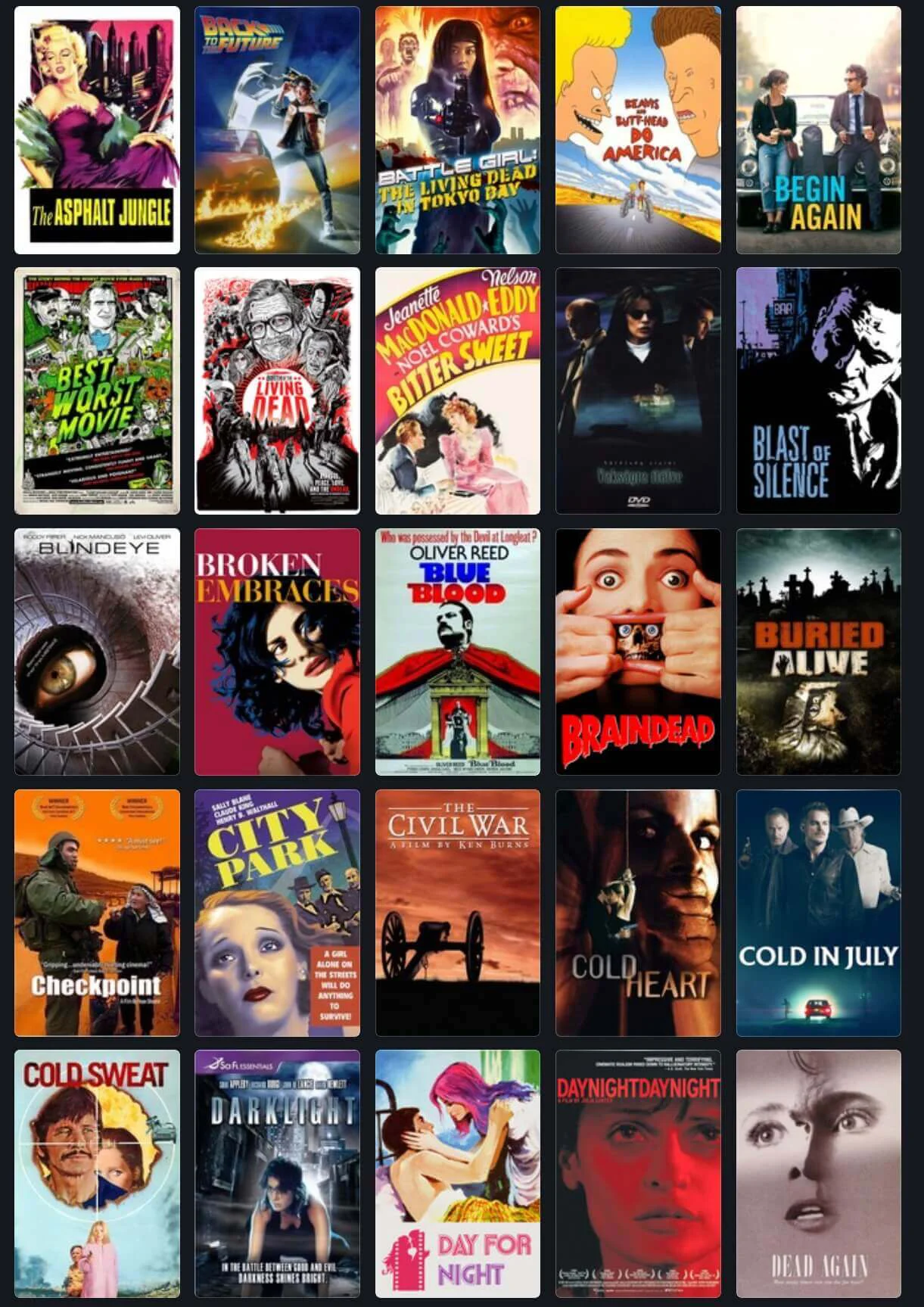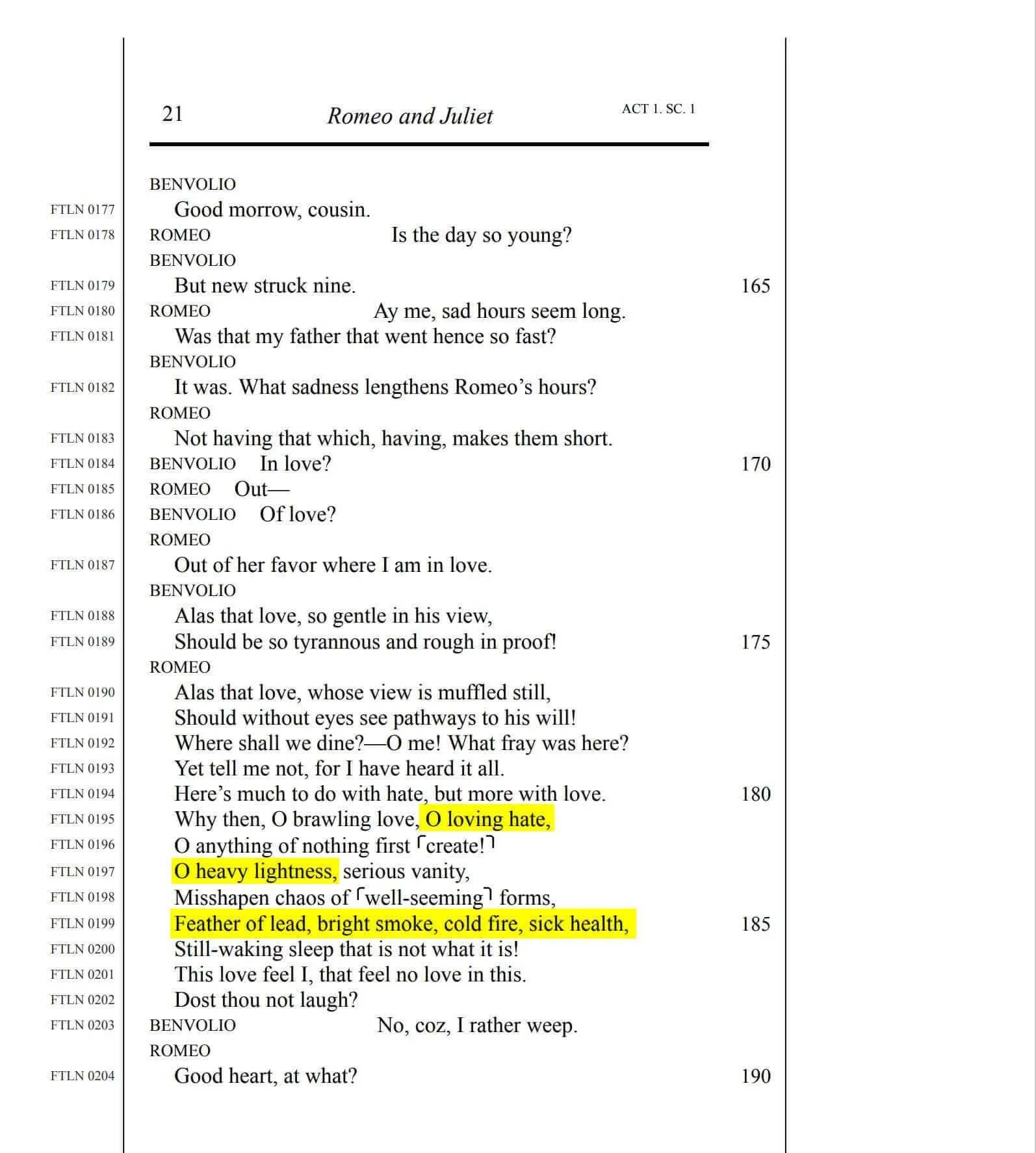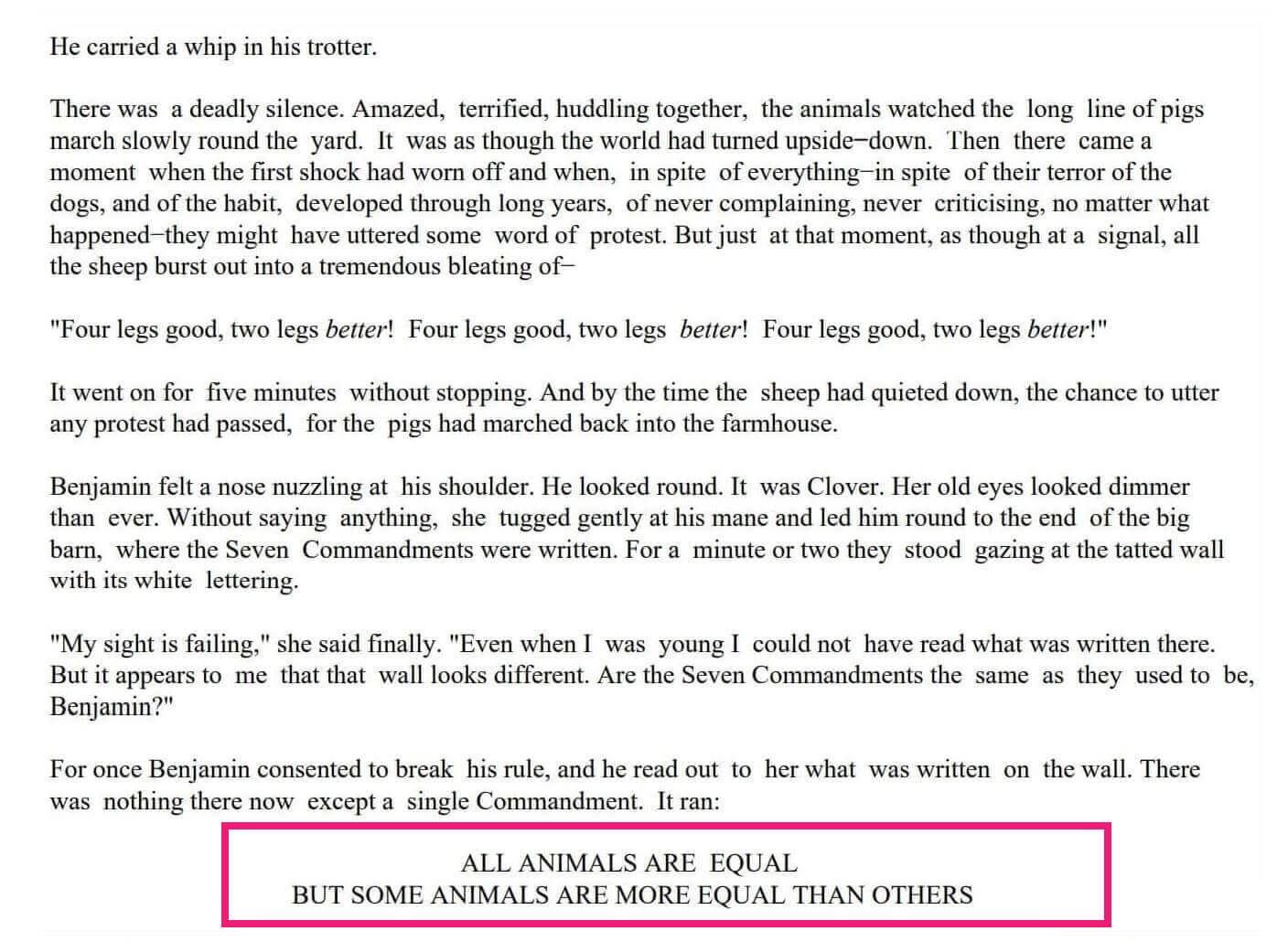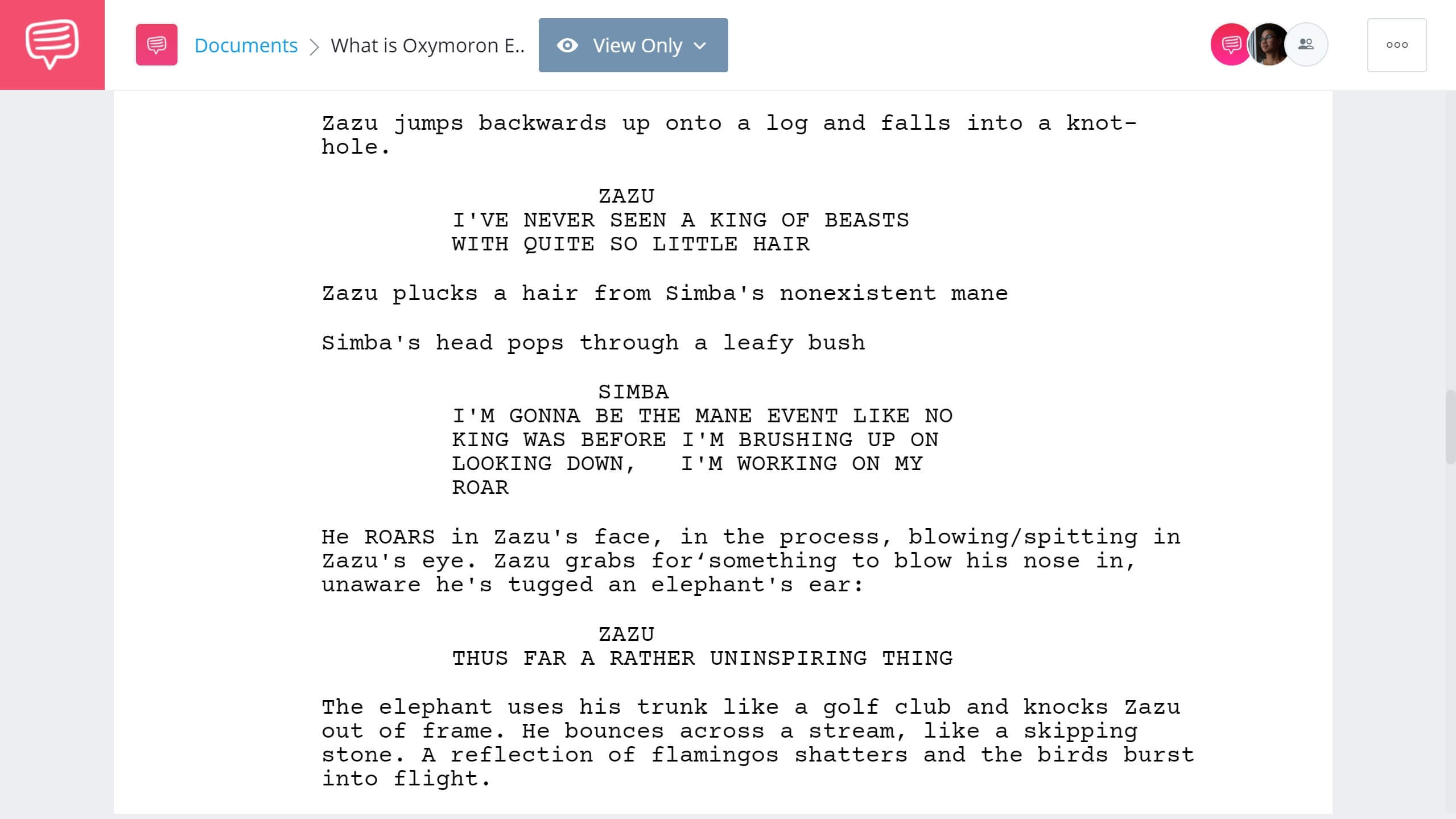If you gathered a small crowd together, then it might be old news to some people to answer, “What is an oxymoron?” The concept is an open secret in the world of literature and film. Of course, you might hear that question with your only response being deafening silence. But once you understand oxymorons inside and out, you can incorporate them into your writing to create humorous, more sophisticated dialogue. Who knows? Oxymorons make awfully good movie titles as well.
Oxymoron Definition and Meaning
Let’s examine the oxymoron definition
Turns out, some of the most well-known novels, plays, and movies have utilized this literary device. Wondering what an example of an oxymoron is? Classic phrases like “jumbo shrimp” or “bittersweet victory” illustrate how two opposing ideas can combine to reveal deeper meaning. You no longer have to wonder: What's an oxymoron? Before we dive deeper, let’s define oxymoron clearly: it’s the clever pairing of contradictory terms to create surprising, layered meaning.
OXYMORON DEFINITION
What is an oxymoron?
An oxymoron is any grouping of oppositional words to create a new, unique word or phrase. The classic definition of oxymoron highlights this clash of ideas, taking two seemingly incompatible words and forging them into something meaningful. At first glance, oxymorons appear to be absurd due to this contrast. However, the juxtaposition of two opposing words can add irony, reveal a deeper meaning behind the text, or add to the dramatic effect.
The word “oxymoron” is itself an oxymoron. The word is derived from two Greek words, namely “oxus” (sharp) and “moros” (dull). Some common oxymoron examples include “pretty ugly,” “only choice,” and “same difference.” Each phrase offers a simple example of oxymoron in everyday language, showing how contradictions can add humor or irony.
Oxymoron Examples in Movie Titles:
- Eyes Wide Shut
- Back to the Future
- True Lies
- Dead Man Walking
- Urban Cowboy
- Mr. Mom
This core meaning—uniting opposites to create a new emotional or philosophical resonance—is why the oxymoron remains so powerful in storytelling, poetry, and even everyday conversation.
This video from Oregon State University does an excellent job of breaking down the concept of contradictory words and phrases.
What is an oxymoron, and what do oxymorons do?
Oxymorons have been used for centuries by some of the greatest writers who ever lived. And if you’re looking to cure your writer's block, then a succinct, clever oxymoron may be just what you need.
Oxymoron Examples
Oxymoron examples in everyday life
Whether you’ve been aware of it or not, you’ve probably heard plenty of oxymorons in your day-to-day life. One such oxymoronic phrase, “alone together,” grew in popularity when much of society went into quarantine in 2020 during the COVID-19 pandemic. As such, you probably saw similar PSAs to this one from the City of Cupertino.
Oxymoron meaning and examples • Alone together
While “alone” and “together” normally don’t go together, the purpose of such messaging was to imply that even though everyone had to stay at home, you weren’t alone in making sacrifices. Everyone was expected to do their part to stay apart from each other so that, shortly, we could all get together once again to celebrate life.
Other oxymoron examples you may come across in your personal and professional lives include:
- Even odds
- Freezer burn
- Growing smaller
- Idiot savant
- Loyal opposition
- Minor miracle
- Seriously funny
- Working vacation
- Silent scream
- Unbiased opinion
Each of these phrases provides an example of oxymoron that has slipped into common usage without most people even noticing the inherent contradiction. Many of these have become so commonplace, people don’t even stop to think about how they don’t technically make any sense together. Each of these everyday phrases is a simple example of oxymoron at work—pairing two contradictory ideas to create something memorable or striking.
OXYMORON MEANING
Oxymoron vs paradox
Oxymorons and paradoxes both involve contradictions. A quick way to remember the oxymoron definition is to think of it as a compressed contradiction—two opposing words side by side to create a sharp impact.
It’s what makes a paradox somewhat of an oxymoron. But what is a paradox concerning an oxymoron? Turns out, the difference all comes down to how their respective contradictions are expressed.
The best oxymorons place two contrasting words next to each other. On the other hand, paradoxes are longer statements that twist contradictions in addition to logic.
Oxymoron and Paradox
The narrator describes the differences between the two concepts in the above videos. Some common paradox examples include:
- The enemy of my enemy is my friend.
- The greatest thing that can come from hate is love.
- I am nobody.
- What a pity that youth must be wasted on the young.
To turn your brain into knots, just think of this: “The last word in this sentence is meaningless.” On one hand, the last word in the sentence is literally “meaningless;” however, that word does, indeed, have a definition. It may not be an oxymoron, but it’s similar in concept to where it makes you stop and think for a minute.
Related Posts
OXYMORON LITERARY DEFINITION
Oxymoron examples in books and music
Numerous authors and playwrights have incorporated oxymorons into their works over the centuries. This figure of speech forces readers to rethink the relationship between seemingly opposing ideas and draws attention to emotional complexity.
The main function of this is to give the reader pause. The reader should be taken aback and examine the combination of words put together to decipher the true meaning.
One of the most famous oxymoron examples in literature comes from William Shakespeare.
Writers often define oxymoron through vivid emotional opposites, like Shakespeare’s famous lines that balance love and violence, sweetness and pain.
Shakespeare’s use of oxymorons offers a textbook oxymoron definition in action, capturing complex emotional states where love feels like hate, or joy feels like sorrow.
A famous oxymoron in Romeo and Juliet continues to puzzle high school students to this day.
Understanding the definition of oxymoron helps reveal why Shakespeare stacked these contradictions so densely, capturing the confusion and intensity of young love.
You can read and adapt to your means via StudioBinder’s screenwriting software.
Read Romeo and Juliet PDF • Oxymoron Definition
This passage contains a list of oxymorons strung together. “Loving hate,” “heavy lightness,” and “cold fire” are all contradictory phrases. So why does Shakespeare do this? Each line provides a powerful example of oxymoron, capturing the conflicting emotions of young love. Anyone who has ever been madly, hopelessly in love could probably tell you.
The idea of love is filled with dualities. You may fawn over the person you adore one second and abhor something else they do the next. People go through numerous extremes when they’re in love. And these oxymorons illustrate that fact.
Another famous sound of silence oxymoron appears in the iconic song by Simon & Garfunkel. The phrase captures the contradiction of silence itself becoming an overwhelming emotional presence, a classic example of oxymoron used in music and poetry.
Oxymorons can also aid in the satire of a piece of work. Read this passage from George Orwell’s Animal Farm.
Read Animal Farm PDF • What is an Oxymoron and Give Examples
The idea of one class being “more equal” than another is inherently hypocritical. It’s another powerful example of oxymoron at work—using contradiction to expose deeper truths about society and politics.
This new commandment laid out by Napoleon the pig points out such hypocrisies that came about after the Russian Revolution. If one class of people is “more equal” than another, then true equality doesn’t exist.
Other oxymoron examples in literature include the following passages.
“Down the close darkening lanes they sang their way to the siding-shed, And lined the train with faces grimly gay.” Wilfred Owen, “The Send-Off”
“Parting is such sweet sorrow.” William Shakespeare, Romeo and Juliet
“His honour rooted in dishonour stood, And faith unfaithful kept him falsely true.” Alfred, Lord Tennyson, Idylls of the King
Once you define oxymoron in literature, you can find it pretty much everywhere, including popular music. Singer John Legend takes a page out of Shakespeare’s book and uses oxymorons to describe the love of his life in the song “All of Me.”
Define oxymoron using John Legend lyrics
Phrases like “perfectly imperfect” and “my end and my beginning” show the depths of Legend’s love. His lover’s contradictions are what attracted him to her in the first place. And it’s her flaws that make her beautiful.
Related Posts
WHAT IS THE DEFINITION OF OXYMORON?
What is an oxymoron in film?
Films use oxymorons in a similar way to classic literature. You can find plenty of examples in movie dialogue and the best movie songs, such as “I Just Can’t Wait To Be King” from The Lion King.
Oxymoron meaning • The Lion King
We’ve already examined The Lion King script in-depth via StudioBinder’s scriptwriting software, but let’s take a look at this particular sequence as it’s written in the screenplay.
The song contains the phrase, “I’m brushing up on looking down.” Simba sings about his excitement in learning how to be king even though it sounds like it will mostly consist of looking down on other animals as they serve him. The line takes on a different meaning later in the film when Simba runs away from his responsibilities.
And while not technically oxymorons, we see other contradictions through this song. In one section, Simba brags about having a mighty mane, to which Zazu responds, “Thus far a rather uninspiring thing.” In this instance, the discrepancy between what Simba wants to become and the reality he presently faces is played for humor.
But one part of the film where you’re more likely to see an oxymoron than anywhere else is in the title.

Using Oxymoron in a Sentence
When the title of a film is an oxymoron, it often signifies there’s some contradiction within the plot that needs to be resolved. Perhaps it should come as no surprise that some of the best zombie movies ever have oxymorons as their titles, such as Night of the Living Dead and The Dead Don’t Die. Each title stands as a vivid example of oxymoron, highlighting the strange tension between life and death.
What is an example of an oxymoron in pop culture? Zombie titles like Night of the Living Dead deliver it perfectly—living and dead, side by side. The contradiction present within monsters that are both dead and alive makes for a unique contrast that the characters have to contend with.
But you don’t need zombies to use oxymorons. If you want to add a dramatic effect to your script and let readers know they’re in for a twisted ride filled with deception, then why not name your movie True Lies?
Oxymorons also create more playful tones. When you have a seriously funny script about a young girl who needs to pose as a boy, the title She’s the Man just makes sense.
Whether it’s to reveal a deeper meaning or to have fun with the English language, at the end of the day, oxymorons just stand out. They force the reader or viewer to sit up straight, pay attention, and give in to their controlled chaos.
How to create an oxymoron?
Want to craft your own? Here’s an easy method:
Pick two opposite ideas that create natural tension. Like “love and hate,” “freedom and confinement,” or “small and huge.”
Find short, punchy words that represent each idea. Like “loving hate,” “jumbo shrimp,” or “deafening silence.”
Place them side-by-side to form a phrase that feels surprising, clever, or slightly unsettling. The best oxymorons create a moment of double-take, forcing readers to pause and think.
Oxymorons work best when they highlight contradictions that spark emotional or philosophical reflection. A great oxymoron doesn’t just sound clever—it reveals a deeper truth about the complexity of emotions, situations, or ideas.
WHAT IS THE OPPOSITE OF OXYMORON?
What is tautology?
Oxymorons function as a literary device to let you have fun with language. But have you ever stopped to consider the opposite of oxymoron? While you may think one doesn’t exist, it does. Both tautology and oxymoron reveal how flexible language can be, whether you’re emphasizing irony or creating repetition for comic effect.
To fully appreciate this flexibility, it helps to define oxymoron and tautology side by side—one bends meaning through contradiction, the other through repetition.
This is known as tautology. While oxymorons consist of contradictory words, tautology refers to words in succession that mean the same thing. Let’s take a look at this classic piece of dialogue from one of the preeminent animation TV series of our times - SpongeBob SquarePants.
Tautology example • SpongeBob SquarePants
Before an onslaught of anchovies show up at the Krusty Krab, Mr. Krabs says the iconic line, “A smelly smells that smells… smelly.” In this instance and scenes similar to it, the purpose is to elicit a chuckle out of the audience at the fact that the character can’t think of another word for “smell.”
While you could refer to this as “redundancy” or “repetition,” you can impress your English teacher by throwing the word “tautology” out there when referring to books and films.
WHAT IS OXYMORON IN LITERATURE?
What’s the purpose of oxymorons?
At the end of the day, oxymorons are good to learn because they demonstrate how fluid language can be. Along with other rhetorical devices, oxymorons show how writers bend and stretch words to reveal deeper emotional or philosophical truths. We tend to have these strict ideas of how people should talk, and oxymorons demonstrate how you can derive a deeper meaning by playing with words and seeing how they fit together in unique ways.
Consider the words of late Congressman John Lewis, who spoke these words: “Get in good trouble, necessary trouble, and redeem the soul of America.” Again, the term “good trouble” is an oxymoron because how could any “trouble” be “good?” It perfectly fits the oxymoron definition, where conflicting ideas combine to express a deeper or higher truth.
Therein lies the significance. Congressman Lewis fought for civil rights his entire life. He participated in marches and protests, sometimes suffering severe injuries in the pursuit of equality. He may have been arrested, gotten in “trouble,” but it was always in service of doing what was “good” for the betterment of society.
He understood that just because something was lawful didn’t always mean it was moral, and his journey was chronicled in the documentary John Lewis: Good Trouble.
Oxymoron Examples in Movies • Good Trouble
There are all kinds of ways to incorporate oxymorons into your writing. Whether it’s to reveal a deeper meaning or to have fun with the English language, at the end of the day, oxymorons just stand out.
They force the reader or viewer to sit up straight, pay attention, and give in to their controlled chaos.
Related Posts
UP NEXT
Explore more literary devices
The oxymoron is just one of many literary devices and types of figurative language, including euphemism, paradox, and connotation. If you're a writer and want to develop your craft fully, do yourself a favor and continue this exploration. The next article on literary devices is a gateway to many of these tools that help add substance and style to any type of written work.



